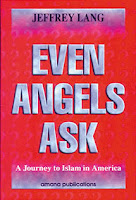Framing the book as a series of discussions, each building on the last, gives the book a nice sense of a story. Framing the book as a series of discussions between the Imam and the uncle – a receptive listener – rather than the Imam and the atheist allows the author to get away with some oversimplifications of the opposing view. You could view this as a criticism of the book. However, this is what allows the book to remain an elementary level read so this is a good thing as far as I am concerned.
I must commend the author for having a go at a couple of really sensitive topics during the course of the book: Evolution and LGBTQA+. The chapter on evolution was my favourite of all the chapters by far. It has left me with food for thought to ponder on well beyond my reading of the book. Overall, this is an excellent book for anyone of faith who wants an easy to read introduction to a number of philosophical concepts. If you're like me, it will leave you with plenty of topics to plug into your conversational AI tool of choice during and after your read of it!
Below are some passages from the book that stood out for me:
"Helping my kids sail their intellectual boats to the shores of safety took priority over pretending that the ocean is stormless."
"... to say: God doesn't exist, is more of a statement of faith than a statement of science or reason."
"The Quran usually describes at length the fact that God created the diversity of life on earth, but it doesn't say how. It only alludes to the origins of everything, which is the Arabic word Turab, or the dirt of the earth. It certainly doesn't describe how it all happens."
"... 'be and it is is' doesn't necessarily suggest the instant sprouting of a being into existence. God in the Quran talks about how man is the product of 'be and it is' yet it takes us, and all creation really, actual time – in our case nine months – to come into existence. And if that is the case, then the evolution of one species from another could be one possible way by which God 'creates'..."
"... the evolutionary process, although it involves what we might consider random processes of natural selection and random genetic mutations, [may] not actually [be] random at all... they [may be] subject to a plethora of factors, of which we simply have no knowledge, and that's why we, out of mental laziness, call it random chance."
"... normalising sin and sinful lifestyle in the name of biological tendencies rips man of agency and free will."
"... things are not as black and white as some might think."
"... the enmity between established Christianity in Europe in the Middle Ages and any form of free thought, made the two mutually exclusive, hence it became necessary to neutralise religion if any progress in science, economics or politics were to be achieved. The same was not true in the Muslim world..."
"... no metaphysical idea managed to survive the incessant molestation of philosophy than that of a Creator."
"... the assumption that the universe has a Maker has not been committed to the museum of antiquated human thought, despite the constant battery. It's not a relic of the past, but an instrument of the present. What are we to do with this interminable lust for God?"
"... God endures."


